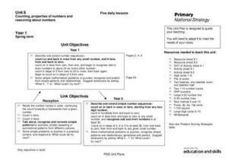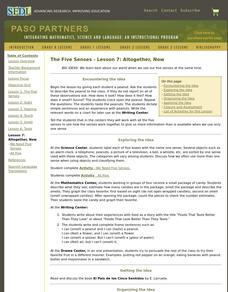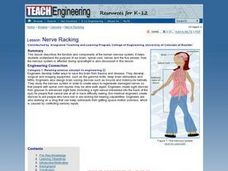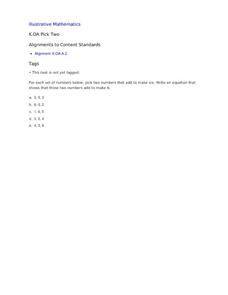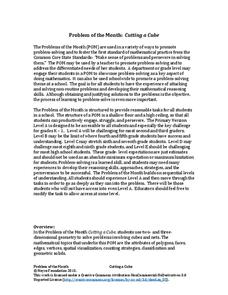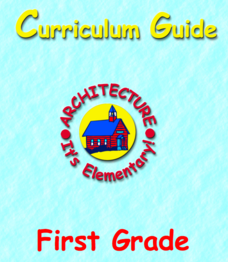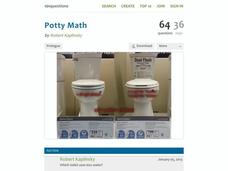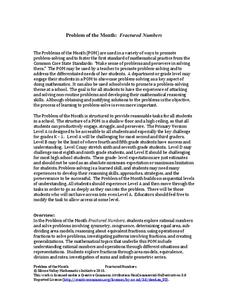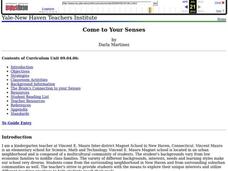EngageNY
The Division Algorithm—Converting Decimal Division into Whole Number Division Using Mental Math
Make math much simpler with mental math methods. The 16th installment in a series of 21 looks at ways scholars can apply mental math to convert division problems into easier problems with the same quotient. Multiplying or dividing both...
Curated OER
Counting, Properties of Numbers, and Reasoning about Numbers
Five days of lessons develop number sense and counting patterns, including odd and even numbers, 5s and 10s, doubles, and ways to make 10. Each session opens with fun finger play to reinforce counting and reasoning about numbers. Various...
Curated OER
Altogether, Now
Students apply their five senses to science, math, drama, and writing center activities.
Curated OER
Nerve Racking
Fifth graders study the components and function of the nervous system. They investigate how engineers design biomedical equipment to assist the nervous system and explain how the five senses are affected during spaceflight.
Curated OER
All About Me: My Senses
Students describe the basic senses and then use their senses to describe what they learned.
Curated OER
Applied Science - Science and Math Lab
Students explore the senses. In this Applied Science lesson, students investigate the items in "feely" boxes with their hands, both touching the items and shaking the boxes to hear the sound the items make. Students also smell and taste...
Illustrative Mathematics
Pick Two
Learning to break apart numbers into smaller pairs is a critical step young mathematicians take as they develop their number sense. To practice this skill, children are provided with sets of three numbers and are asked to pick the two...
Scholastic
Adding and Subtracting Ten
Developing fluency with basic addition and subtraction is fundamental to the success of all young mathematicians. This four-day lesson series begins with learners using ten-frames and hundreds charts to recognize patterns when adding and...
Noyce Foundation
Cutting a Cube
Teach the ins and outs of the cube! A series of five K–12 level activities explore the make-up of the cube. The beginning lessons focus on the vocabulary related to the cube. Later lessons explore the possible nets that describe a cube....
Noyce Foundation
Cut It Out
Explore the mathematics of the paper snowflake! During the five lessons progressing in complexity from K through 12, pupils use spatial geometry to make predictions. Scholars consider a folded piece of paper with shapes cut out....
Curated OER
What Is It? Tommy Tastes
Students complete multi-curricular to learn about senses and sensory words. In this sensory words lesson, students discuss the five senses and the anatomy of a tongue. Students complete a food tasting activity and find descriptive words...
American Institute of Architects
Architecture: It's Elementary!—First Grade
Build an interest and appreciation for architecture in your young learners with this fun 10-lesson art unit. Engaging children in using their five senses, the class first observes the environment around them, paying...
Arizona Department of Education
Introduction to Integers
Welcome to the backward world of negative numbers. This introductory lesson teaches young mathematicians that negative numbers are simply the opposite of positive numbers as they use number lines to plot and compare...
Curriculum Corner
“I Can” Common Core! 1st Grade Math
Any first grader can master the Common Core math standards with this checklist! With each standard rewritten as an affirmative I can statement, children are provide with clear goals to work toward throughout the school...
Curated OER
Contaminated Drinking Water
Students predict, experiment, and draw conclusions about the safety of drinking water. In this ecology instructional activity, students participate in an experiment to determine if they can taste or see contamination in drinking water....
Curated OER
Lesson 3: Number Sense
Learners solve word problems using number sense. They convert fractions to decimals and mixed numbers. Pupils determine if a given fraction is greater or less than another fraction, and order numbers on a number line.
Inside Mathematics
Archery
Put the better archer in a box. The performance task has pupils compare the performance of two archers using box-and-whisker plots. The resource includes sample responses that are useful in comparing individuals' work to others.
101 Questions
Potty Math
You don't want to flush your money down the drain! Have your classes complete a financial comparison between two different types of toilets. They use linear modeling to determine the most cost-effective model.
Noyce Foundation
Fractured Numbers
Don't use use a fraction of the resource — use it all! Scholars attempt a set of five problem-of-the-month challenges on fractions. Levels A and B focus on creating fractions and equivalent fractions, while Levels C, D, and E touch on...
Curated OER
Math for the Frontier
Make history come to life by using the Frontier House series to engage learners in the past. Your class will "prepare" for a trip to 1833 Montana. They will learn about homesteading, frontier life, inflation, and cost of living. Using...
NTTI
Putting Together Ten
Groups explore sets of 10 items in two varieties (i.e. 3 white buttons and 7 black ones, or 5 bears and 5 bunnies). They brainstorm about their objects, write math sentences to represent what they have, and report their discoveries...
State of Michigan
Pre-K Mathematics
Kick-start children's education with this pre-school math unit. Offering 31 different hands-on learning activities that develop young mathematicians' pattern and shape recognition, basic number sense, and much more, this is a...
Curated OER
Number Sense and Numeration: Multiples, Factors and Square Roots
A great resource for any math teacher covering multiples, factors or square roots; this worksheet walks young mathematicians through the logic behind factoring and square roots with a systematic set of problems which gradually increase...
Curated OER
Come to Your Senses
Students explore their senses. In this biology lesson plan, students will learn about their senses, what affects them, and how the brain works to control our senses in a series of lab activities.

